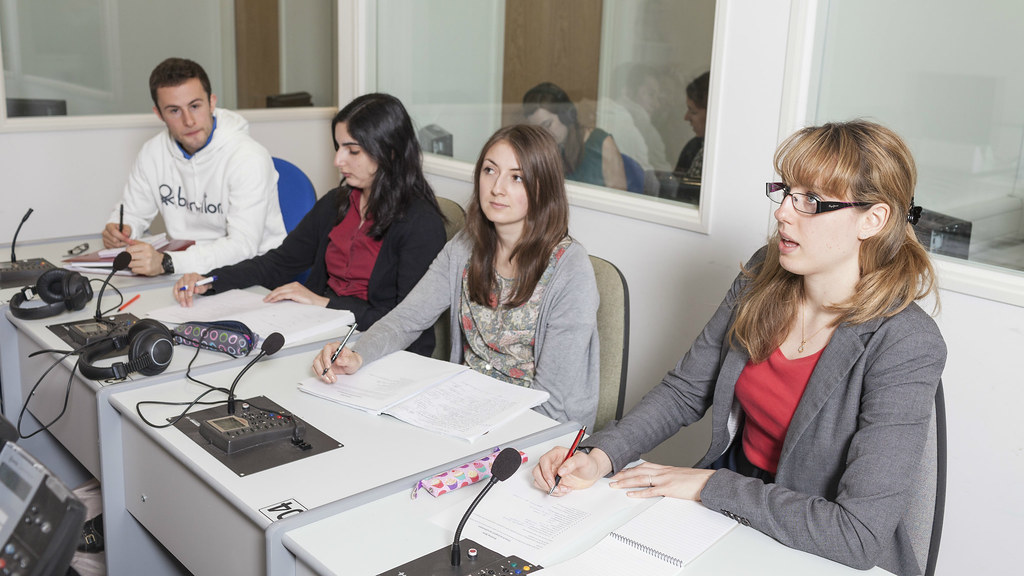As of this month our MA in Interpreting and Translating (MAIT), which this year celebrates 50 years, now provides more English booth interpreters for the United Nations (UN) and its operations around the world than any other.
For the latest intake, graduates from our course were some of the most successful in the highly competitive, rigorous UN exams through which interpreters must pass.
As of April 2016, nearly one third of English booth UN staff interpreters in Geneva, including the Chief of Booth, will have come through the Bath course. As demonstrated by the 2015 freelance and staff exams, this means our Masters is currently the most successful MA course for the training of English booth UN interpreters.
Central role in climate talks
Last year two of the recent MAIT graduates played a central role in the COP21 Climate Conference in Paris, providing simultaneous interpreting during the opening plenaries and throughout discussions.
Director of Studies for MA in Interpreting and Translating and the MA in Translation and Professional Language Skills, Dr David Clarke sees the unique opportunities provided to students by way of placement and training schemes as key to the course’s success.
He explains: “The input from seasoned interpreters and our placement and training schemes offer our students first-hand experience of life in busy interpreting booths. This is invaluable in terms of their future career prospects. Our students are passionate, committed and relish the thrills and challenges that come with the life of an interpreter.”
To prepare students for the rigorous UN examinations is a mammoth task for any teacher. MAIT teachers endeavour to bridge the gap between study and the workplace within one year only and in doing so rely heavily on support of employers of interpreters.
Professor Bill Durodié, Head of the Department of Politics, Languages & International Studies, commented: “It’s a fantastic reflection of the excellent training opportunities provided to our students that more of the UN's interpreters have gone through the course at Bath than anywhere else. One can meet Bath graduates in the English booth of almost every international organisation, and hear their voices at the most important meetings, be it the United Nations, the European Parliament or European Commission.”
Calibre of students and excellent opportunities
Pro-Vice-Chancellor (Internationalisation) Professor Colin Grant added: “The fact that more and more of our interpreting and translating graduates are going on to work for the world’s leading international agencies reflects the calibre of the students we recruit and the excellent opportunities they are afforded while studying with us. The stunning success of our Interpreting and Translating postgraduate courses, and the esteem in which they are held worldwide, is testimony to a great partnership between our committed and passionate staff on the programme and their equally committed and passionate students.”
Staff Interpreter at the United Nations, Geneva and graduate from the Bath course, Neil Cumming was one of our graduates providing interpretation during the plenary for the COP21 climate talks in Paris last December.
He said: “I knew embarrassingly little about the practicalities of interpreting when I applied to study at Bath, but was attracted by the programme’s reputation and the enthusiasm of the teaching staff. I was immediately certain I had made the right choice. The programme was tough and required a big time commitment, but it gave me a solid grounding in the core modes of conference interpreting, consecutive and simultaneous.
“The material covered at Bath was not only varied and interesting, but also, as I soon discovered upon starting work, directly relevant to the often highly specialised subjects dealt with at the UN. Many of the tutors had extensive experience as conference interpreters in their own right, and were clearly willing us to succeed. Aside from practical instruction, both staff and alumni provided an impressive array of connections with interpreting markets around the world. During the programme I had the opportunity of a placement in Geneva, which allowed me to meet future employers and practice interpreting the meetings and subjects that have become my bread and butter. Interpreting for international organisations is a competitive field, but MAIT gave me everything I needed to succeed.”
There is both a European Stream (focusing on French, German, Italian, Russian and Spanish) and a Chinese stream available to students at Bath.
Graduates from the course go on to work for a variety of international organisations in addition to the UN. These include the European Commission and European Parliament (based in Brussels and Luxembourg), Council of Europe (in Strasbourg), the International Court of Justice (The Hague), NATO (in Brussels), the Foreign and Commonwealth Office (London), the European Central Bank (in Frankfurt) as well as institutions such as the BBC World Service.

